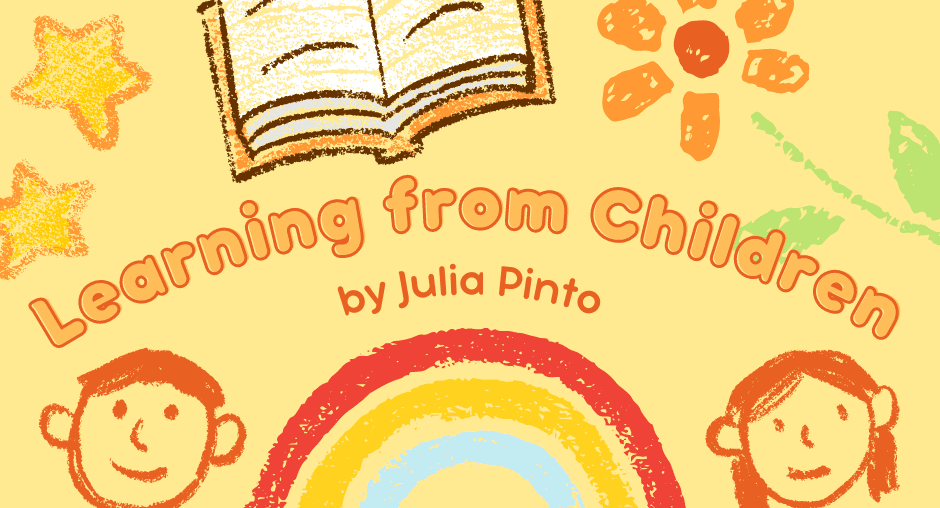Learning from Children

Editor’s note: Julia Pinto, a missioner in the US-Mexico Border region, shares how the children she meets and teaches at CAME, a migrant shelter in Agua Prieta, teach her how to be loving, welcoming, and intentional.
“Maestra Julia, what words would you like to learn in Spanish? We can teach you.”
That is my best attempt at a translation from Spanish. Every Tuesday for the last four months, I have visited the children at the Centro de Atención al Migrante Exodus (or CAME, pronounced Cah-May), which is the migrant shelter here in Agua Prieta. I am not their official teacher, but they still insist on calling me Maestra.

On my last day with the children, we made large chalk drawings on the patio at the shelter. They asked me to draw the outlines of different characters for them to color in.
As I arrive at CAME at 10 in the morning, they often run to greet me in Spanish and wrap me in warm embraces. Upon my request, the oldest boy carries a table upstairs for us to use in the classroom while the others grab chairs for all of us.
One Tuesday in early January, I learned that they would be leaving shortly thereafter. My heart was full of sadness, as they each took different pieces of my heart with them, yet also gratitude for the precious time that we shared and that they would be one step closer to receiving asylum in the US.
As a safety measure, I must exclude their names, ages, faces, destination, etc., but I will still try to convey who they are as unique, creative, affectionate, hilarious, lovable people – with all of the normal wildness that comes with being a kid.
One girl plays with blocks with the toddler and teaches her different colors in Spanish: “This is RED. Now you say it, RED.” I bought little star stickers to provide positive feedback, and the girls love it when I put stickers on their hands and face.
Another girl puts Elmer’s glue on her paper in the shape of smiley faces. She likes to wear my jacket and hat, frequently asks me to tie her shoelaces, plays with my watch, and will dance spontaneously. I can’t get over the fact that she wants to complete her math sums from inside the cardboard box that her brother is using as his table that day. She shows me a booboo on her finger, so I kiss it. (“Maestra, what is a booboo?”) Then the smallest child asks me to kiss her finger too, and I comply even though her finger is perfectly fine.
One day we practiced with our toy instruments and then sang happy birthday to one of the staff members at CAME. Despite the mediocre musical talent, she was brought to tears by the children’s enthusiastic love.
One boy wrote sweet thank you notes to each of the staff and volunteers at CAME. Then when I wrote little love notes to each of the kids to say goodbye, he came and dug his face into my side – overcome with emotion – and could only get out the words, “Gracias, Maestra Julia.”
I would like to say that I was a good “maestra” for them, but I cannot say that in all honesty. I have to admit that many times I dreaded going because I crave control and order. I should have been more intentional in teaching them English to help them get ready for life and school in the US. I should have planned more engaging and fun activities for them to help them get excited about learning. I should have spoken more words of affirmation to them to encourage their good behavior and show them that they are loved and wonderful. I should have focused more on my relationships with them over my own agenda.
But despite my frequent lack of passion, intentionality, or creativity, these children and their families decided to love me wholeheartedly. They constantly invited me to join them for lunch and treated me like one of their own.
Life on mission is unpredictable and teaches us to let go of control since ministries and community are so fluid and fluctuating. I showed up the following Tuesday and some of the kids were still there. Now that I have more time with these children, I have a chance to begin again. I get to reflect on those above-mentioned “shoulds” and make the most of my remaining time with them, be it ten months or ten days.
Ministry was supposed to be me loving them, but all I know is that they have showered me with undeserved acceptance, patience, trust, and affection. I thank God for bringing them into my life. They have softened me, helped me improve my Spanish, and taught me to find enjoyment amidst the mundane. I hope that our paths somehow miraculously cross again one day so that I can see the amazing adults that I know they will become. But even if not, I will carry each of these treasures forward with me in my heart.
Question for Reflection: What has God taught you recently through the people around you? Where might you discover hidden joys in your everyday life?
Tagged in:

